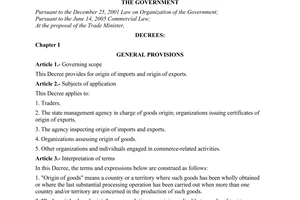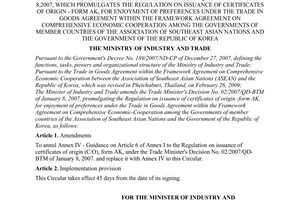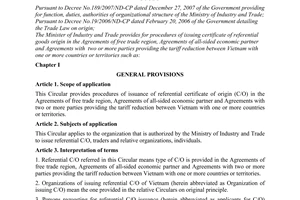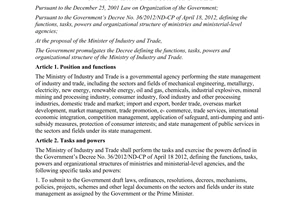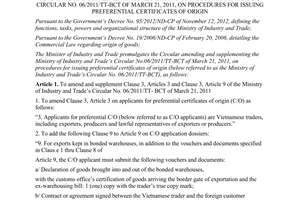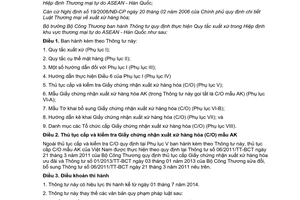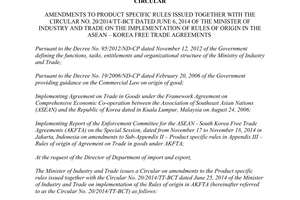Nội dung toàn văn Circular No. 20/2014/TT-BCT rules of origin in the Agreement establishing Asean Korea free trade area
|
MINISTRY OF
INDUSTRY AND TRADE |
SOCIALIST
REPUBLIC OF VIETNAM |
|
No: 20/2014/TT-BCT |
Hanoi, June 25, 2014 |
CIRCULAR
ON THE IMPLEMENTATION OF RULES OF ORIGIN IN THE AGREEMENT ESTABLISHING ASEAN – KOREA FREE TRADE AREA
Pursuant to Decree No. 95/2012/ND-CP dated November 12, 2012 of the Government defining the functions, tasks, entitlements and organizational structure of the Ministry of Industry and Trade;
Pursuant to Approval Letter of Steering Committee for ASEAN – Korea Free Trade Agreement dated June 27, 2013 on the amendments of Appendix I - Procedures for issuance and verification of Certificates of Origin in Appendix III - Rules of Origin of the Trade In Good Agreement within the framework of ASEAN – Korea Free Trade Agreements.
Pursuant to Decree No. 19/2006/ND-CP dated February 20, 2006 of the Government provide guidance on the Commercial Law on origin of good;
The Minister of Industry and Trade issues Circular on the implementation of rules of origin in the Agreement establishing Asean – Korea Free Trade Area as follows:
Article 1. The following Appendices are issued together with this Circular:
1. Rules of origin (Appendix I);
2. Rules of specific products (Appendix II);
3. Guidance on Appendix I (Appendix III);
4. Guidance on Article 6 of Appendix I (Appendix IV);
5. Procedures for issuance and verification of Certificate of Origin (C/O) (Appendix V);
6. Certificate of Origin form AK (hereinafter is referred to as C/O form AK) (Appendix VI-A);
7. Supplementary Declaration of Certificate of Origin (C/O) (Appendix VI-B);
8. Guidance on declaration of Certificate of Origin (C/O) (Appendix VII);
9. List of Certificate of Origin (C/O) issuing bodies (Appendix VIII).
Article 2. Procedures for issuance and verification of C/O – Form AK
Apart from procedures for issuance and verification of C/O prescribed in Appendix V issued together with this Circular, the procedures for granting C/O – Form AK of Vietnam shall be implemented as prescribed in Circular No. 06/2011/TT-BCT dated March 21, 2011 of the Ministry of Industry and Trade on procedures for issuance of preferential Certificate of Origin and Circular No. 01/2013/TT-BCT dated January 03, 2013 of the Ministry of Industry and Trade on amendments to Circular No. 06/2011/TT-BCT dated March 21, 2011.
Article 3. Implementation
1. This Circular shall come into force from July 01, 2014.
2. This Circular shall replace the following legislative documents:
a) Decision No. 02/2007/QD-BTM dated January 01, 2007 of the Ministry of Commerce (now the Ministry of Industry and Trade) on the Regulations on issuance of Certificate of Origin – Form AK to claim for preferential tariff treatments under Trade in Good Agreement within the Framework Agreement on Comprehensive Economic Cooperation Among the Governments of the Member Countries of the Association of Southeast Asian Nations and the Republic of Korea;
b) Decision No. 005/2007/QD-BCT dated November 05, 2007 of the Ministry of Industry and Trade on amendments to Decision No. 02/2007/QD-BTM;
c) Circular No. 17/2009/TT-BCT dated June 29, 2009 of the Ministry of Industry and Trade on amendments to Decision No. 02/2007/QD-BTM;
d) Circular No. 38/2009/TT-BCT dated December 18, 2009 of the Ministry of Industry and Trade on implementation of Rules of specific good under Harmonized System Nomenclature version 2007 in Rules of origin of the Asean - Korea Agreement on Trade In Good./.
|
|
PP. MINISTER |
APPENDIX V
PROCEDURES FOR ISSUANCE AND VERIFICATION OF C/O
(Issued together with Circular No. 20/2014/TT-BCT dated June 25, 2014 of the
Ministry of Industry and Trade on the implementation of Rules of origin in the
Agreement establishing ASEAN – Korea Free Trade Area)
For the purposes of implementing Appendix I, the following operational procedures on the issuance of Certificate of Origin (C/O), verification of origin and other relevant administrative matters shall be observed:
Article 1. Interpretation of terms
For the purpose of this Appendix, the terms below are construed as follows:
“Back-to-back Certificate of Origin” means a C/O issued by an intermediary exporting Party, which is based on a previous C/O issued by the first exporting Party;
“Customs Authority” means a competent authority that is responsible under the laws and regulations on customs[1] , according to the laws and regulations of Party;
“Exporter” means a natural or juridical person who resides in territory of a Party where goods are exported by such person ;
“Importer” means an a natural or juridical person who resides in territory of a Party where goods are imported by such person;
“C/O issuing body” means a competent authority designated by the government of exporting Party to issue a C/O and notified to every other Parties as specified in this Appendix;
“Producer” means a natural or juridical person who carries out production as set out in territory of a Party specified in Clause 2, Article 1 of Appendix I.
Article 2. C/O issuing bodies
1. Each Party shall provide the names, addresses, specimen signatures and specimen of official seals of its issuing bodies of all the other Parties, through the ASEAN Secretariat. Any change in the aforesaid list shall be promptly provided in the same manner.
2. Any C/O issued by an official not included in the said list in Clause 1 may not be honored by the Customs Authority.
Article 3. Documentary evidences
For the purposes of determining originating status, the C/O issuing bodies shall have the right to call for supporting documentary evidence or to carry out any check considered appropriate in accordance with respective laws and regulations of Party.
Article 4. Application for issuance of C/O
1. A producer/exporter of the good, or its authorized representative shall apply to issuing bodies, in accordance with law and regulations of Party, requesting a pre-exportation examination of the origin of the good before to be exported. The result of the examination, subject to review periodically or whenever appropriate, shall be accepted as the supporting evidence in determining origin of the said good to be exported thereafter. The pre-exportation examination may not apply to the good of which, by its nature, origin can be easily determined.
2. The producer/exporter or its authorized representative shall apply for a C/O together with appropriate supporting documents, proving that the good to be exported qualify for the issuance of C/O in accordance with law and regulations of Party.
3. C/O issuing bodies shall, to the best of its competence and ability, carry out proper examination, in accordance with law and regulations of Party, upon each application for a C/O to ensure that:
a) The C/O is duly completed and signed by the authorized signatory;
b) The origin of the good is in conformity with Appendix I;
c) Other statements in the C/O correspond to supporting documentary submitted;
d) Description, quantity and weight of good, marks and numbers of packages, number and kinds of packages, as declared, conform to the good to be exported.
4. Multiple items declared on the same C/O, shall be allowed, provided that each item must qualify separately in its own right.
Article 5. C/O
1. A C/O shall be on A4 size paper and shall be in the form in Appendix VI-A and referred to as Form AK. It shall be in the English language.
2. A C/O shall comprise one original and two carbon copies. The colors of the original and the copies of a C/O shall be mutually agreed upon by the Parties. Where multiple items are declared on the same C/O, the Party may use Supplementary Declaration C/O using form in Appendix VI-B; particularly, ASEAN Parties may decide whether to use the Supplementary Declaration C/O or use a new C/O.
3. A C/O shall bear a reference number separately given by a local government or a C/O issuing body. C/O form AK only be stated FOB in the box 9 when applying regional value content (RVC)[2].
4. The original copy shall be forwarded by the producer/or exporter to the importer for submission to the customs authority of the importing Party. The duplicate shall be retained by the issuing bodies of the exporting Parties. The triplicate shall be retained by the producer and/or exporter.
5. The C/O issuing bodies shall periodically provide records of issuance of C/O, including issuing number and date, producer and/or exporter and description of good, to the customs authority of the importing Parties.
6. In cases where a C/O is rejected by the customs authority of an importing Party, the subject C/O shall be marked accordingly in box 4 and the original C/O shall be returned to the C/O issuing body within a reasonable period but not more than two months. The C/O issuing body shall be notified of the grounds for the denial of preferential treatment.
7. In cases where a C/O is not accepted, as prescribed in Clause 6, the customs authority of the importing Party, as it deems fit, should accept the clarifications made by the C/O issuing body to accept C/O and reinstate the preferential tariff treatment. The clarifications should be detailed and exhaustive in addressing the grounds for denial of preferential tariff treatment raised by the importing Party.
Article 6. Rectification of errors on C/O
Neither erasures nor superimpositions shall be allowed on a C/O. Any alternation shall make as follows:
1. Strike out the erroneous materials and making any addition required. Such alternations shall be approved by an official authorized to sign a C/O and certified by the C/O issuing body. Unused spaces shall be crossed out to prevent any subsequent addition, or
2. Grant a new C/O to replace with error C/O. The C/O issuing body shall copy date of issue from error C/O onto new C/O.
Article 7. C/O issuance
1. A C/O shall be issued at the time of exportation or soon thereafter provided that not more than 03 working days from the date of shipment, if the good to be exported can be considered to be originating in the territory of the exporting Party within the meaning of Appendix I.
2. C/O issuing bodies of a intermediary Party may issue a back-to-back C/O, if an application is made by the exporter while the good is passing through its territory, provided that:
a) A valid original C/O is presented;
b) The importer of the intermediary Party and the exporter who applies for the back-to-back C/O in the intermediary Party are the same; and
c) Verification procedures as prescribed in Article 14 are applied.
3. Upon request of a Party, other Parties shall review the provisions of this Article and implementation thereof, and revise it as may be mutually agreed upon by every Parties.
4. In exceptional cases where a C/O has not been issued at the time of exportation or soon thereafter provided that not more than 03 working days due to involuntary errors, omissions or other valid causes, a C/O may be issued retroactively but no later than 01 year from the date of shipment, and bearing the words “ISSUED RETROACTIVELY”.
Article 8. Certified true copy
In the event of theft, loss, or destruction of a C/O, the producer/exporter may apply to the C/O issuing body for a certified true copy of the original. The C/O issuing body shall issue the copy on the basis of the export documents in possession bearing the endorsement of the words “CERTIFIED TRUE COPY” in the box 12 of a C/O. This copy shall bear the date of issue of the original C/O. The certified true copy shall be issued no later than one year from the date of issue of the original C/O.
Article 9. Presentation of C/O for preferential tariff treatment
For the purposes of claiming preferential tariff treatment, the importer shall submit to the customs authority of the importing Party at the time of import, a C/O together with supporting documents (i.e. invoices, the through Bill of Lading issued in the territory of the exporting Party when the goods are pass through territories of one or multiple intermediary states, not exporting Parties or importing Parties) and other documents as required in accordance with the domestic laws and regulations of the importing Party.
Article 10. Effect of C/O
1. The C/O shall be submitted to the customs authority of a importing Party within 12 months from the date of issue, or from the date of issue of the original C/O if C/O is replaced as prescribed in Article 6 or from the date of issue of the original C/O if back-to-back C/O is issued.
2. Where the C/O is submitted to the customs authority of the importing Party after the expiration of the time-limit as stated in Clause 1, such C/O shall be accepted when the failure to observe such time-limit results from force majeure events or other valid causes beyond the control of the producer/exporter.
3. In all cases, the customs authority of the importing Party may accept such C/O, provided that the good have been imported before the expiration of the time-limit of the said C/O.
Article 11. C/O exemption
A C/O shall not be required for:
1. A good originating in the territory of a Party which does not exceed US$ 200.00 FOB; or
2. A good sent by post from the territory of Party which does not exceed US$ 200.00 FOB.
Requirement for this rule is that the importation does not form part of one or more importations that may reasonably be considered to have been undertaken or arranged for the purpose of avoiding the submission of a C/O.
Article 12. Handling minor discrepancies
1. Where the origin of a good is not in doubt, the discovery of minor discrepancies, between the statements made in a C/O and those made in the documents submitted to the customs authority of the importing Party for the purpose of carrying out the formalities for importing the good shall not ipso facto invalidate the C/O, if it does in fact correspond to the good submitted.
2. For multiple items declared under the same C/O, a problem encountered with one of the items listed shall not affect or delay the granting preferential tariff treatment and customs clearance of the remaining items listed in that C/O. Point c Clause 1 of Article 14 shall be applied to the problematic items.
Article 13. Keeping record
1. For the purposes of the verification process pursuant to Article 14 and Article 15, producer/exporter shall keep its supporting record for application for at least 03 years from the date of issue of the C/O in accordance with the laws and regulations of the exporting Party,. During aforesaid 03 years, if the producer/exporter could not submit documentary evidence proving origin of good as prescribed in case of required, his claiming of preferential tariff treatment may be rejected.
2. The importer shall keep records relevant to the importation in accordance with laws and regulations of the importing Party.
3. The application of C/O and all documents related to such application shall be retained by the C/O issuing body for at least 03 years from the date of issue.
4. At the request of the importing Party, information relating to validity of a C/O shall be furnished by an official authorized to sign a C/O, and certified by the competent agencies of the Government.
5. Any information communicated between the Parties concerned shall be treated as confidential and shall be used for the validation of C/O purpose only.
Article 14. Verification
1. The importing Party may request C/O issuing body of the exporting Party to conduct a retroactive check at random and/or the importing Party has reasonable doubt as to the authenticity of the document or as to the accuracy of the accuracy of the information regarding the true origin of the good in question or of certain parts thereof. Upon such request, C/O issuing body[3] of the importing Party shall conduct a retroactive check on a producer’s/exporter’s cost statement based on the current cost and prices within a six-month period from the date of exportation[4], subject to the following procedures:
a) The request of the importing Party for a retroactive check shall be accompanied with the C/O concerned and shall specify the reasons and any additional information suggesting that the particulars given on the said C/O may be inaccurate, unless the retroactive check is requested on a random basis;
b) When receiving a request for retroactive check, the C/O issuing body of the exporting Party shall respond to the request promptly and reply within 02 months from the receipt of the request.
c) The customs authority of importing Party may suspend provision of preferential tariff treatment while awaiting the result of verification. However, it may release the good to the importer subject to any administrative measures deemed necessary, provided that they are not held to be subject to import prohibition or restriction and there is no suspicion of fraud; and
d) The C/O issuing body shall promptly transmit the results of the verification process to the importing Party which shall then determine whether or not the subject goods are originating. The entire process for retroactive check, including the process of notifying the C/O issuing body of the result of determination on whether or not the goods are originating, shall be completed within 06 months. While the process of the retroactive check is being undertaken, Point c Clause 1 of Article 14 shall be applied.
2. The customs authority of the importing Party may request an importer for information or documents relating to the origin of imported good in accordance with laws and regulations of the importing Party before requesting the retroactive check pursuant to Clause 1.
Article 15. Verification in the exporting country
1. If the importing Party is not satisfied with the outcome of the retroactive check, it may, under exceptional circumstances, request verification visits to the exporting Party.
2. Prior to conducting a verification visit pursuant to Clause 1:
a) An importing Party shall deliver a written notification of its intention to conduct the verification visit simultaneously to:
- The producer/exporter whose premises are to be visited;
- The C/O issuing body of which the verification visit is to occur;
- The customs authority of which the verification visit is to occur; and
- The importer of the good subject to the verification visit.
b) The written notification mentioned in Point a shall be as comprehensive as possible and shall include, among others:
- The name of the customs authority issuing the notification;
- The name of the producer/exporter whose premises are to be visited;
- The proposed date of the verification visit;
- The coverage of the proposed verification visit, including reference to the good subject to the verification visit; and
- The names and designation of the officials performing the verification visit.
c) The importing Party shall obtain the written consent of the producer/exporter whose premises are to be visited;
d) In case a written consent from the producer/exporter is not obtained within 30 days from the date of receipt of the notification as prescribed in Point a, the aforesaid importing Party may deny preferential tariff treatment to the good would have been subject to the verification visit;
dd) When receiving the notification, the C/O issuing body may postpone the proposed verification visit and notify the importing Party of such intention within 15 days from the date of receipt of notification dd) Regardless of postpone, the verification visit shall be conducted within 60 days from the date of receipt of notification or it may last longer by mutually agreed upon by the Parties.
3. The Party conducting the verification visit shall provide the exporter whose goods are subject to the verification and the related C/O issuing body with verification in writing that whether or not the subject goods are originating.
4. Any postponement of granting for preferential tariff treatment shall be considered according to result of verification as prescribed in above Clause 3 that the subject goods are originating.
5. The producer/exporter entitled to request in writing or provides the supporting evidence related to origin of goods within 30 days from the date of receipt of the notification. If the origin of goods are considered inappropriate, the final decision shall be sent the C/O issuing body within 30 days from the day on which the clarification of the producer/exporter is received.
6. The verification visit process, including the actual visit and the determination as prescribed in Clause 3, whether the good subject to such verification is originating or not, shall be carried out and its results communicated to the C/O issuing body within a maximum period of 06 months from the first day the initial verification visit was conducted. While the process of the verification visit is being undertaken, Point c Clause 1 of Article 14 shall be applied.
Article 16. Protecting confidentiality of information
1. The Parties, in accordance with their respective laws and regulations, the confidentiality of classified business information collected in the process of verification pursuant to Article 14 and Article 15 and shall protect that disclosure that could prejudice the competitive position of the person who provided the information.
2. Subject to the laws and regulations, and agreement of the Parties, classified information may only be disclosed by the competent agencies of one Party to another, for the administration and enforcement of origin determination.
Article 17. Denial of preferential tariff treatment
Except as otherwise provided in this Appendix, the importing Party may deny claim for preferential tariff treatment or recover unpaid duties in accordance with laws and regulations, where the good do not meet the requirements of Appendix I, or where the relevant requirement of this Appendix are not fulfilled.
Article 18. Special cases
When destination of all or parts of the good exported to the territory of a specified Party is changed, before or after its arrival in the territory of that Party, the following shall be observed:
a) Even if the goods are already imported into the territory of a specified importing Party, the customs authority of that importing Party shall endorse the C/O to the effect for all or parts of the good in case where the importer makes a written application for the preferential tariff treatment along with the submission of the original C/O; and
b) If the changing of destination occurs during transportation to the territory of the importing Party as specified in the C/O, the producer/exporter shall apply in writing, accompanied with the issued C/O, for a new C/O for all or parts of the good.
Article 19. Documentary evidence for direct transportation
For the purposes of implementing Article 9 of Appendix I, where transportation is effected through the territory of one or more intermediary countries, other than that of the exporting Party and the importing Party, the following shall be produced to the relevant competent agencies of the importing Party:
1. A through Bill of Lading issued in the territory of the exporting Party;
2. C/O;
3. A copy of the original commercial invoice in respect of the good; and
4. Other relevant supporting documents, if any, as evidence that the requirements of direct transportation are being complied with.
Article 20. Goods for exhibition
1. A good sent from a exporting Party for exhibition in another country and sold during or after the exhibition for importation into the territory of a Party shall be granted preferential tariff treatment on the condition that the good meets the requirements as set out in Appendix I, provided that information it is shown to the satisfaction of the customs authority of the importing Party that:
a) An exporter has dispatched the good from the territory of exporting Party to the country where the exhibition has been held and has exhibited it there;
b) The exporter has sold the good or transferred it to a consignee in the territory of importing Party;
c) The good has been consigned during the exhibition or immediately thereafter to the territory of the importing Party in the state in which it was sent for the exhibition.
2. For the purposes of implementing Article 1, the original C/O shall be provided to the relevant competent agencies of the importing Party, the name and address of the exhibition shall be indicated. As an evidence for the good and the conditions under which it was exhibited, a certificate issued by the relevant competent agencies of the country where the exhibition took place together with supporting documents prescribed in Clause 4 of Article 19 may be required.
3. Clause 1 shall apply to any trade, agricultural or crafts exhibition, fair or similar show or display in shops or business premises with a view to the sale of foreign good and where the good remains under customs control during the exhibition.
Article 21. Third country invoicing
1. The customs authority in the importing Party may accept C/O in cases where the sales invoice is issued either by a company located in a third country or by an exporter for the account of the said company, provided that the good meets the requirements of Appendix I.
2. The exporter of the good shall indicate “Third country invoicing” and such information as name and country of the company issuing the invoice in the C/O.
Article 22. Action against fraudulent acts
1. When it is suspected that fraudulent acts in connection with a C/O have been committed, the government authorities concerned shall cooperate in the action to be taken by a Party against the persons involved.
2. Each Party shall provide legal sanctions for fraudulent acts related to a C/O.
Article 23. Customs contact point
1. Each Party shall designate a contact point for all matters related to this Appendix.
2. When the contact point of a Party raises any matter arising from this Appendix to the contact point of any other Party, the customs authority of the latter Party shall assign its own experts to look into the matter and to respond with its findings and proposed solution for resolving the matter within a reasonable period of time.
3. The contact points shall endeavor to resolve any matter raised under this Appendix through consultations./.
[1] Laws and regulations on customs adhered to by customs authorities of every Party are provisions, regulations on import, export, and transit of goods, by its nature, related to customs duties, costs and other taxes; or embargoes, limitations, and control on good transportation subject to supervision along the borders by customs authorities of every Party.
[2] With respect to Cambodia and Myanmar, the C/O Form AK issued to and from them shall reflect the FOB value regardless of the origin criteria for the transition period of two years from January 1, 2014.
[3] The C/O issuing body of Korea, as prescribed in Article 14 and Article 15, that verifies the origin of goods exported to Parties of the ASEAN, is a customs authority of Korea in accordance with laws and regulations of customs of it.
[4] Regarding to 6-month period, the C/O issuing body of exporting Party may decide whether to choose 6 months before or after date of exportation.
------------------------------------------------------------------------------------------------------
This translation is made by THƯ VIỆN PHÁP LUẬT and
for reference purposes only. Its copyright is owned by THƯ VIỆN PHÁP LUẬT
and protected under Clause 2, Article 14 of the Law on Intellectual Property.Your comments are always welcomed
